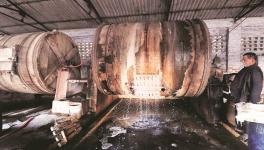Workers of 500 Coal-Based Panipat Units to be Jobless After Shutdown
Representational use only.Image Courtesy: Wikimedia Commons
Workers employed with more than 500 industries, especially dyeing units along with export houses, mink and polar blanket units, in Panipat, Haryana, will be jobless after they shut down on Saturday following the directions of the Commission for Air Quality Management (CAQM).
Almost six lakh workers are employed directly or indirectly with around 25,000 textile units in Panipat, globally known as the textile hub with an annual turnover of Rs 40,000 crore, The Tribune reported.
Besides, as many as 400 industries, including dyeing units and rubber factories operational on coal-fired boilers, in Sonepat will be shut down as well for not switching over to the cleaner fuel, according to the report.
As per CAQM directions issued in February, any industry in the designated industrial areas running on conventional fossil fuels, like coal, diesel, coke and HSD in the NCR region, would be shut down after September 30.
The industries were directed to use cleaner fuels, including piped natural gas (PNG), LPG, biogas, propane, butane, and biomass fuels, such as paddy straw, rice husk and wooden blocks, from October 1.
Earlier, a three-member industry delegation had met CAQM chairman MM Kutti on September 27 seeking an extension of the deadline till March 31, 2023, to switch their units to biomass fuels or gas boilers. However, according to Lalit Goyal, president, Panipat Exporters’ Association, Kutti refused to extend the deadline.
Subsequently, the Panipat Dyers Association decided on Friday to shut their industries failing to get relaxation from the CAQM.
The Haryana State Pollution Control Board (HSPCB) will launch a special checking mission for implementing the CAQM directions.
Following the CAQM directions, some industries started using cleaner fuels like biomass and PNG. Only 40-42 industries in Panipat have PNG connections.
Besides, the graded response action plan also came into effect on Saturday with the HSPCB directing the administration of 14 districts under the NCR to prepare for its implementation.
Association president Bhim Rana told The Tribune that around 600 factories have no option but to shut down.
Rajiv Chawla, chairman, Integrated Association of Micro, Small & Medium Enterprises of India, said that the Faridabad and Gurugram industry cannot “bear an additional cost of Rs 20,000 core on fuel conversion” adding that “if there is round-the-clock power supply, no one will go for genset power as it raises the cost of production by up to 20%”.
Goyal too had pointed out that it is not easy to switch from one fuel to another. The price of biomass fuel surged by around 30%-40% in the past three months, which would not be feasible for the industries, he added.
Besides, it would be very costly to switch from existing boilers to gas-based ones as most of the industries are medium, small and micro. “For the biomass fuel, the industries have to have incumbent boilers,” Goyal said. Gas boiler suppliers are limited and the waiting time period to change them is six months to one year, he added.
Pritam Singh Sachdeva, president, Panipat Industrial Association, had said the industries are already facing a crisis and the “CAQM directions and the implementation of GRAP had increased their stress. The government will have to intervene in the matter to save the industries in Panipat”.
Get the latest reports & analysis with people's perspective on Protests, movements & deep analytical videos, discussions of the current affairs in your Telegram app. Subscribe to NewsClick's Telegram channel & get Real-Time updates on stories, as they get published on our website.
























